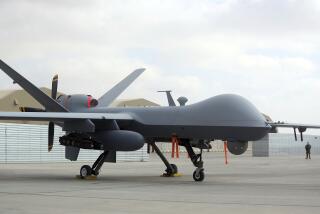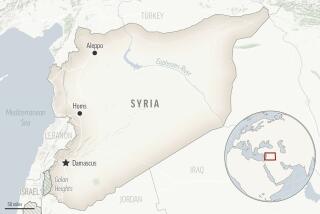Russia joins calls for U.N. probe of alleged chemical attack in Syria
BEIRUT — The Syrian government was coming under increasing pressure Friday from allies and adversaries alike to allow the United Nations to investigate allegations of a chemical attack near Damascus this week.
Russia, a key ally of Syrian President Bashar Assad, joined the growing chorus of nations calling for a U.N. inquiry into opposition charges that hundreds were killed in a poisonous-gas onslaught early Wednesday targeting several suburbs of Damascus, the capital.
There was no word yet from the Syrian government about whether it would allow U.N. investigators already on the ground in Damascus to investigate the incident.
As calls for an investigation broadened, there were signs that some foreign backers of the various sides in the raging Syrian conflict had already concluded who was responsible for the attack.
Moscow suggested that it was Syrian rebels, not the military, who carried out the operation in a well-orchestrated bid to discredit the government and spur international intervention against Assad’s rule.
“We are dealing with a preplanned provocation,” Foreign Ministry spokesman Alexander Lukashevich said in a statement in Moscow.
But Britain, a major supporter of the Syrian opposition, said Friday that Assad’s government probably was the culprit.
“I know that some people in the world would like to say that this is some kind of conspiracy brought about by the opposition in Syria,” British Foreign Secretary William Hague said in London. “I think the chances of that are vanishingly small, and so we do believe that this is a chemical attack by the Assad regime.”
Russia said that Foreign Minister Sergei Lavrov and U.S. Secretary of State John F. Kerry had discussed the issue and concluded that the two nations had a “mutual interest” in backing a U.N. inquiry.
The opposition has charged that the Syrian government unleashed a barrage of poisonous-gas-tipped rockets on rebel strongholds to the east and south of the Syrian capital. Syrian authorities have vehemently denied the allegations.
Video footage and photographs said to be of the victims, including many women and children, have caused worldwide revulsion and demands for an independent inquiry. Experts have said the footage is inconclusive but may indicate that a nerve agent was deployed.
On Friday, news agencies reported that U.N. Secretary-General Ban Ki-moon had said the use of chemical weapons in Syria would “constitute a crime against humanity.” There was “no time to lose” in getting to the bottom of the matter, he was quoted as saying during a visit to Seoul.
The U.N. high representative for disarmament affairs, Angela Kane, was expected to arrive in Damascus on Saturday in a bid to push for access to the sites of the alleged attacks, news agencies reported.
The 20-member U.N. team currently in Syria has a limited mandate to investigate three alleged chemical attacks that occurred months ago. The team arrived in Damascus on Sunday, after months of sometimes difficult negotiations with Syria and other member states about access and other issues. Expanding the team’s mandate to include the most recent reported chemical strikes would require Syria’s cooperation.
Any agreement about an expanded U.N. inquiry would also have to include some kind of security regimen to protect U.N. personnel. This week’s alleged attacks occurred outside of Damascus, in areas that are the sites of frequent clashes between pro- and anti-government forces.
ALSO:
North, South Korea agree to hold family reunions
Toll rises in deadly explosions outside two Lebanon mosques
Gang rape of photojournalist shocks India; 1 arrested, 4 sought
Special correspondent Alexandra Sandels in Stockholm contributed to this report.
More to Read
Sign up for Essential California
The most important California stories and recommendations in your inbox every morning.
You may occasionally receive promotional content from the Los Angeles Times.









